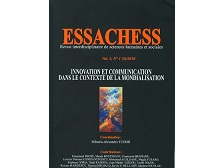Le marketing universitaire - innovation communicationnelle pour survivre efficacement sur le plan (inter)-national
University Marketing - Innovative Communication for Effective Inter/national Survival
Author(s): Mariana Nicolae, Roxana-Elisabeta MarinescuSubject(s): Social Sciences
Published by: ESSACHESS
Keywords: university marketing; organizational identity; organizational communication; globalization; education markets
Summary/Abstract: Positioning of universities on the different educational markets is critical for academic survival, role definition and status clarification on the present education markets. The latter are defined by the globalization of educational services, an increased number of players and their almost fierce competition to attract students and funding. The ever increasing competitiveness all over the world, the new missions that universities have to assume due to pressures from stakeholders, and also from global processes (among which demographics and technology are ever more uncomfortable) are important issues that call for a clear organisational communication, as well as for an effective interorganisations information exchange. The present paper explores the importance of identity building for a coherent communication process meant to ensure the adaptability of a Romanian university to the needs of both its Romanian public, and also to those of an international audience. The case study under discussion is The Bucharest Academy of Economic Studies (BAES), its identity, vision and mission and strategies development. The analysis of the identity building process in the BAES starts from the definition of the university as a “research and teaching university which organises higher and scientific preparation in the area of economic and administrative studies”, as approved by the Senate in 2007 (www.ase.ro). As an important dimension of the identity building process refers to its reception by the public involved, a questionnaire was given to a number of staff and students. The findings of this questionnaire, as well as several opinions verbalised during formal and informal meetings and personal conversations are included in this study.
Journal: ESSACHESS - Journal for Communication Studies
- Issue Year: III/2010
- Issue No: 02
- Page Range: 117-138
- Page Count: 21
- Language: English

